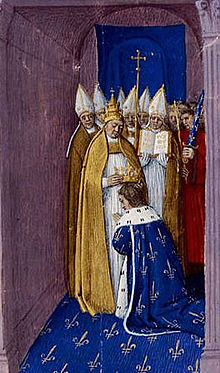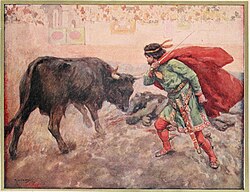Pepin the Short
Giving up pretense, Pepin then forced Childeric into a monastery and had himself proclaimed King of the Franks with the support of Pope Zachary in 751.Not all members of the Carolingian family supported the decision, and Pepin had to put down a revolt led by Carloman's son, Drogo,[citation needed] and again by Grifo.[4] The ceremony took place in the Abbey Church of St. Denis, and the Pope formally forbade the Franks ever to elect as king anyone who was not of the sacred race of Pepin.The Byzantine Greeks, keen to make good relations with the growing power of the Frankish Empire, gave Pepin the title of Patricius.[citation needed] In wars of expansion for the Frankish realm, Pepin conquered Septimania from the Umayyad and Andalusian Muslims and defeated them at the siege of Narbonne in 759,[6][7] and proceeded to subjugate the southern realms by repeatedly defeating Waiofar and his Gascon troops, after which the Gascon and Aquitanian lords saw no option but to pledge loyalty to the Franks.Grifo, Charles's son by his second wife, Swanahild (also known as Swanhilde), demanded a share in the inheritance, but he was besieged in Laon, forced to surrender and imprisoned in a monastery by his two half-brothers.[citation needed] At the time of Carloman's retirement, Grifo escaped his imprisonment and fled to Duke Odilo of Bavaria, who was married to Hiltrude, Pepin's sister.Under the reorganization of Francia by Charles Martel, the dux et princeps Francorum was the commander of the kingdom's armies, in addition to his administrative duties as mayor of the palace.This, together with granting the title of Patrician of the Romans, which was connected to the role of Defensor Civitatis (protector of oppressed citizens), meant that Pepin was now designated as the defender of the Church.After a meeting with Pope Stephen II at Ponthion, Pepin forced the Lombard king to return the seized property from the Church.The Frankish king went on to invest Narbonne, the main Umayyad stronghold in Septimania, but could not capture it from the Iberian Muslims until seven years later in 759,[14] when they were driven out to Hispania.[15] Pepin, in turn, besieged the Aquitanian-held towns and strongholds of Bourbon, Clermont, Chantelle, Bourges and Thouars, defended by Waiofar's Gascon troops, who were overcome, captured and deported into northern France with their children and wives.He continued his father's expansion of the Frankish church (missionary work in Germany and Scandinavia) and the institutional infrastructure (feudalism) that would prove the backbone of medieval Europe.



King of the FranksChilderic IIICharlemagneMayor of the PalaceNeustriaCharles MartelAustrasiaCarlomanSaint-DenisKingdom of the FranksBasilica of St DenisBertrada of LaonCarloman IGiselaDynastyCarolingianRotrude of HesbayeChalcedonian ChristianityFrenchRotrudeChristian monksAbbey Church of St. DenisFranciaBurgundyProvenceAlemanniaThuringiaBavariansAquitaniansSaxonsAlemanniMerovingian monarchChristian ChurchPapacySaint BonifacePope ZacharyStephen IILombardsDonation of PepinPapal StatesByzantine GreeksPatriciusSeptimaniaUmayyadAndalusianMuslimssiege of Narbonne in 759WaiofarGasconGermaniaGermanic tribesbesiegedmonasteryOdilo of BavariaCarolingian dynastyPippinidsPippin the ElderGrimoaldChildebert the AdoptedArnulfingsArnulf of MetzAnsegiselChlodulf of MetzPepin of HerstalGrimoald IIDrogo of ChampagneTheudoaldCarolingiansPepin the HunchbackCharles the YoungerPepin of ItalyLouis the PiousPepin I of AquitaineTreaty of VerdunLothair I, Holy Roman EmperorMiddle FranciaCharles the BaldWest FranciaLouis the GermanEast FranciaBoniface, Archbishop of MainzClausula de PippinoSaint-Jean-de-MaurienneVergilius of SalzburgCollectio canonum HibernensisSoissonsPope Stephen IINarbonneAistulfducatus RomanusRavennaPentapolisNîmesMagueloneBeziersAnsemund'sIberianin 759RoussillonBourbonClermontChantelleBourgesThouarsToulouseconqueredBordeauxBasilica of Saint DenisMetropolitan ParisBertradaSalic lawheavy cavalryFranceGermanyScandinaviafeudalismFranksEuropeDanubeCaribert of LaonCharlesDeanesly, MargaretLondonNew York CityRoutledgeCollins, Roger